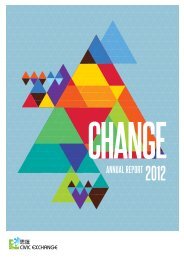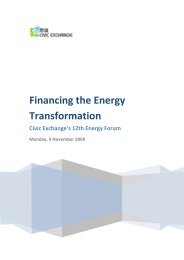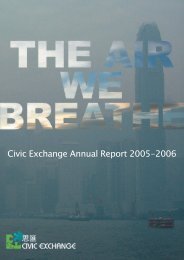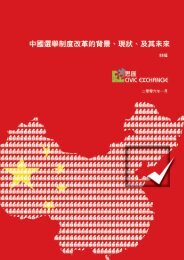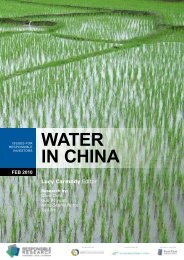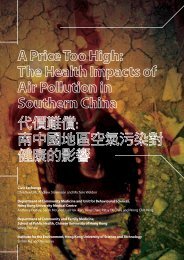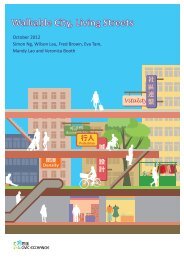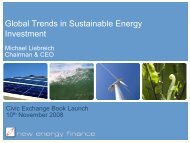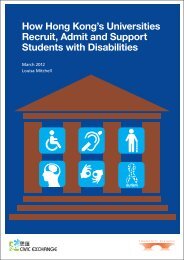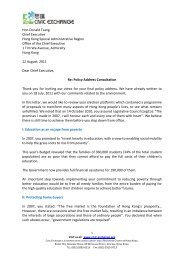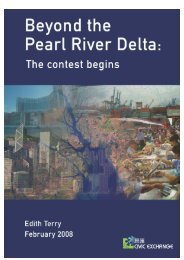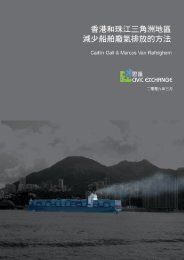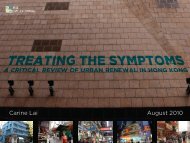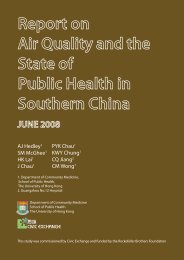Untitled - Civic Exchange
Untitled - Civic Exchange
Untitled - Civic Exchange
You also want an ePaper? Increase the reach of your titles
YUMPU automatically turns print PDFs into web optimized ePapers that Google loves.
INTRODUCTION & SUMMARY<br />
The Hong Kong Special Administrative Region of China (HKSAR) has arguably been a "world city" 1<br />
("Asia's World City") for at least the past several decades. Yet, as with any economy heavily dependent on<br />
trade, changing fortunes in an evolving world economy make the future status of the HKSAR far from<br />
assured. A further, and more specific issue is that Hong Kong, unlike other urban centers often cited as<br />
"world cities," 2 faces a continuing and rapid expansion of its population. Historically, the rate of increase<br />
has been about one million persons per decade and a similar or only moderately slower pace is expected<br />
for the next decade and a half. 3<br />
As the HKSAR grows from a city of about 7 million in 2002 to a city of about 9 million in 2020, it must<br />
cope with the need to increase the supply of housing, transport, and other infrastructure-intensive services<br />
by nearly 30%. The expansion of transport services in an already densely populated and highly developed<br />
landscape threatens to seriously undermine the quality of life in the HKSAR, even if the economy remains<br />
strong and personal freedoms remain sufficiently secure. Hence, the need to make Hong Kong's transport<br />
system more sustainable is vital for the entire community and not merely for planners and<br />
environmentalists.<br />
It would be detrimental to the quality of life of Hong Kong people, as well as for the HKSAR's aspirations<br />
to remain a "World City" if current Transport Bureau and Transport Department policy were to be the sole<br />
basis of dialogue on this issue. To promote a more vigorous community dialogue, <strong>Civic</strong> <strong>Exchange</strong>, with a<br />
grant from the Asia Foundation, has developed a set of three alternative visions for a more sustainable<br />
transport system for the HKSAR. This report outlines one vision, which consists of an integrated set of<br />
planning- and technology-based strategies. 4<br />
An alternative vision for Hong Kong's transport system<br />
A transport system should be considered sustainable only if it meets two basic conditions. First, it must<br />
meet current needs for mobility without imposing unacceptable costs, including external costs, on<br />
those who use it and are affected by it. Second, it must be able to meet projected future needs for<br />
mobility at acceptable costs. Does Hong Kong's current transport system meet these criteria<br />
In some respects, Hong Kong's transport system is among the best in the world. Almost everyone can rely<br />
on convenient, comfortable, and affordably priced public transport. Good transport is also central to Hong<br />
Kong's status as an international business center and logistics hub. The internal costs of transport for<br />
passengers, including transport fares, time spent waiting for transport service, and the quality of the<br />
journey, are low. In terms of internal costs, Hong Kong clearly does very well.<br />
However, the external costs of Hong Kong's transport system - the costs experienced by the community as<br />
a whole - are much higher. Pollutant emissions from Hong Kong's road transport increase air pollution<br />
levels. Road traffic also exposes at least one million people to excessive traffic noise.<br />
1 HKSAR Government (1999), "Bringing the Vision to Life - Hong Kong's Long Term Development Needs and<br />
Goals," in Quality People, Quality Home: Positioning Hong Kong for the 21st Century, Hong Kong.<br />
2 While the cities on this list vary, cities like London, Paris, New York, and Tokyo are typically included.<br />
3 Transport Department (1999), Third Comprehensive Transport Study, Hong Kong: HKSAR Government.<br />
4 The two other reports, published in February 2002, are Sustainable Transport in Hong Kong, by Dick Rooks and<br />
Derckjan Smaling, and Electrifying Hong Kong: Making Transport Sustainable, by Richard Gilbert, both available<br />
at http://www.civic-exchange.org.<br />
1



